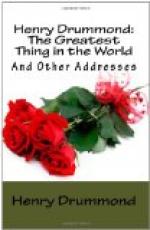It teaches us sympathy and toleration with all men who venture upon the ocean of truth to find out a path through it for themselves. Do you sometimes feel yourself thinking unkind things about your fellow-students who have intellectual difficulty? I know how hard it is always to feel sympathy and toleration for them; but we must address ourselves to that most carefully and most religiously. If my brother is shortsighted I must not abuse him or speak against him; I must pity him, and if possible try to improve his sight, or to make things that he is to look at so bright that he cannot help seeing. But never let us think evil of men who do not see as we do. From the bottom of our hearts let us pity them, and let us take them by the hand and spend time and thought over them, and try to lead them to the true light.
What has been
THE CHURCH’S TREATMENT OF DOUBT
in the past? It has been very simple. “There is a heretic. Burn him!” That is all. “There is a man who has gone off the road. Bring him back and torture him!”
We have got past that physically; have we got past it morally? What does the modern Church say to a man who is skeptical? Not “Burn him!” but “Brand him!” “Brand him!”—call him a bad name. And in many countries at the present time, a man who is branded as a heretic is despised, tabooed and put out of religious society, much more than if he had gone wrong in morals. I think I am speaking within the facts when I say that a man who is unsound is looked upon in many communities with more suspicion and with more pious horror than a man who now and then gets drunk. “Burn him!” “Brand him!” “Excommunicate him!” That has been the Church’s treatment of doubt, and that is perhaps to some extent the treatment which we ourselves are inclined to give to the men who cannot see the truths of Christianity as we see them.
Contrast
CHRIST’S TREATMENT
of doubt. I have spoken already of His strange partiality for the outsiders—for the scattered heretics up and down the country; of the care with which He loved to deal with them, and of the respect in which He held their intellectual difficulties. Christ never failed to distinguish between doubt and unbelief. Doubt is “can’t believe”; unbelief is “won’t believe.” Doubt is honesty; unbelief is obstinacy. Doubt is looking for light; unbelief is content with darkness. Loving darkness rather than light—that is what Christ attacked, and attacked unsparingly. But for the intellectual questioning of Thomas, and Philip, and Nicodemus, and the many others who came to Him to have their great problems solved, He was respectful and generous and tolerant.




